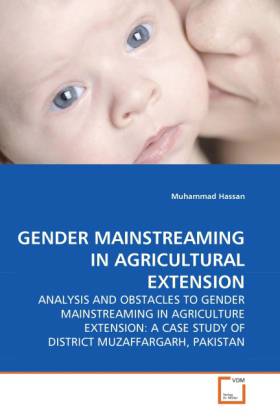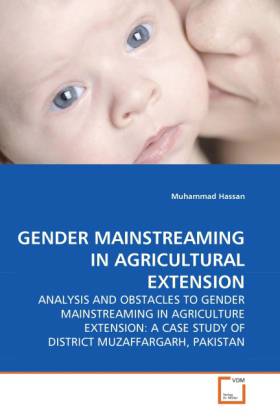
Je cadeautjes zeker op tijd in huis hebben voor de feestdagen? Kom langs in onze winkels en vind het perfecte geschenk!
- Afhalen na 1 uur in een winkel met voorraad
- Gratis thuislevering in België vanaf € 30
- Ruim aanbod met 7 miljoen producten
Je cadeautjes zeker op tijd in huis hebben voor de feestdagen? Kom langs in onze winkels en vind het perfecte geschenk!
- Afhalen na 1 uur in een winkel met voorraad
- Gratis thuislevering in België vanaf € 30
- Ruim aanbod met 7 miljoen producten
Zoeken
GENDER MAINSTREAMING IN AGRICULTURAL EXTENSION
ANALYSIS AND OBSTACLES TO GENDER MAINSTREAMING IN AGRICULTURE EXTENSION: A CASE STUDY OF DISTRICT MUZAFFARGARH, PAKISTAN
Muhammad Hassan
Paperback | Engels
€ 100,45
+ 200 punten
Omschrijving
The access to non-formal and extension education is limited for females in Pakistan. In this case study of district Muzaffargarh, a multi stage random sampling technique was employed. Main findings indicated that majority of husband and wife respondents were illiterate. Women received relatively less benefit from different sources of information that not only hindered them to avail better sources of employment but also made their position pity at home and community level. These women were also neglected by Agriculture Extension Department where all the extension agents were male who were restricted socially, customary and religiously to meet with women farmers which ultimately resulted in quite serious state of gender inequality in the field of extension education. The main obstacles to gender mainstreaming in Agricultural Extension include restriction to meet males other than blood relations, socio-economic insecurity, inadequate political empowerment, improper transportation, residential problem for female extension workers, and male ego in respect of their vested dominance.
Specificaties
Betrokkenen
- Auteur(s):
- Uitgeverij:
Inhoud
- Aantal bladzijden:
- 264
- Taal:
- Engels
Eigenschappen
- Productcode (EAN):
- 9783639275667
- Verschijningsdatum:
- 22/07/2010
- Uitvoering:
- Paperback
- Afmetingen:
- 152 mm x 229 mm
- Gewicht:
- 390 g

Alleen bij Standaard Boekhandel
+ 200 punten op je klantenkaart van Standaard Boekhandel
Beoordelingen
We publiceren alleen reviews die voldoen aan de voorwaarden voor reviews. Bekijk onze voorwaarden voor reviews.









